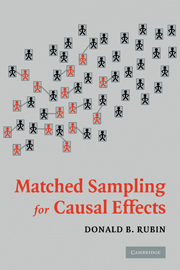Book contents
- Frontmatter
- Contents
- Contributor Acknowledgments
- Matched Sampling for Causal Effects
- My Introduction to Matched Sampling
- PART I THE EARLY YEARS AND THE INFLUENCE OF WILLIAM G. COCHRAN
- PART II UNIVARIATE MATCHING METHODS AND THE DANGERS OF REGRESSION ADJUSTMENT
- PART III BASIC THEORY OF MULTIVARIATE MATCHING
- PART IV FUNDAMENTALS OF PROPENSITY SCORE MATCHING
- PART V AFFINELY INVARIANT MATCHING METHODS WITH ELLIPSOIDALLY SYMMETRIC DISTRIBUTIONS, THEORY AND METHODOLOGY
- PART VI SOME APPLIED CONTRIBUTIONS
- PART VII SOME FOCUSED APPLICATIONS
- Conclusion: Advice to the Investigator
- References
- Author Index
- Subject Index
PART I - THE EARLY YEARS AND THE INFLUENCE OF WILLIAM G. COCHRAN
Published online by Cambridge University Press: 05 June 2012
- Frontmatter
- Contents
- Contributor Acknowledgments
- Matched Sampling for Causal Effects
- My Introduction to Matched Sampling
- PART I THE EARLY YEARS AND THE INFLUENCE OF WILLIAM G. COCHRAN
- PART II UNIVARIATE MATCHING METHODS AND THE DANGERS OF REGRESSION ADJUSTMENT
- PART III BASIC THEORY OF MULTIVARIATE MATCHING
- PART IV FUNDAMENTALS OF PROPENSITY SCORE MATCHING
- PART V AFFINELY INVARIANT MATCHING METHODS WITH ELLIPSOIDALLY SYMMETRIC DISTRIBUTIONS, THEORY AND METHODOLOGY
- PART VI SOME APPLIED CONTRIBUTIONS
- PART VII SOME FOCUSED APPLICATIONS
- Conclusion: Advice to the Investigator
- References
- Author Index
- Subject Index
Summary
Even though this book is limited to reprinting publications of mine on matched sampling, it seems useful to provide some background history to the topic. As described in the initial introduction, I had already started working on matching before I met Bill Cochran. But Bill had been working on the design and analysis of observational studies for many years before my appearance.
I reviewed Cochran's work on observational studies, including his early papers, in Rubin (1984c), the first chapter in this book. This was originally a chapter written for a volume honoring Cochran's impact on statistics, edited by Rao and Sedransk (1984). My review starts with Cochran (1953a), which focused on stratified and pair matching on a single covariate, X, and their effects on efficiency of estimation. That chapter continued with Cochran (1965), which was a compendium of advice on the design and analysis of observational studies. Also reviewed was Cochran (1968a), on subclassification and stratified matching, an article that I regard as extremely important. It was a departure from his earlier work on matching, as well as other early work on the effects of matching, all of which focused on the efficiency of estimation (e.g., Wilks (1932), which assumed exact matching with a normally distributed variable; Greenberg (1953), which compared mean matching and regression adjustment; Billewicz (1965), which I've always found relatively confusing).
- Type
- Chapter
- Information
- Matched Sampling for Causal Effects , pp. 5 - 6Publisher: Cambridge University PressPrint publication year: 2006

